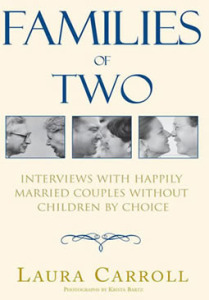 When it comes to how not wanting kids is seen in our society, we’ve come a long way from just a decade ago. At that time, there were some scholarly studies on “voluntary childlessness,” a few books out on the topic, and rarely did we see it covered in the media.
When it comes to how not wanting kids is seen in our society, we’ve come a long way from just a decade ago. At that time, there were some scholarly studies on “voluntary childlessness,” a few books out on the topic, and rarely did we see it covered in the media.
However, when I began my search for childfree couples to interview for Families of Two I quickly learned there were lots of childfree and childfree couples out there. When I advertised for interview participants, overnight my email inbox and voicemail burst full of messages from couples who were thrilled that, as one woman put it, “finally someone wants to hear from us.” At that time, so many childfree couples I talked with felt they lived in the tributaries of society.
Since then, they have sailed out of those tributaries and we know more about the choice to have no children than ever before. In the last decade, researchers have studied it more than ever before. Thanks to the internet, we’ve seen an explosion of information about the childfree in the digital world like never before. The topic has appeared in television and radio media more than ever before. And there continues to be a growing host of authors and journalists writing about this topic than ever before.
So it is not as surprising to see titles like this one that recently appeared in The Atlantic, “Not Wanting Kids Is Entirely Normal.” And to questions like the one Abby Huntsman asked in a recent Huffington Post Live discussion, “Is it OK for women to not want kids?” — We know the answer: Yes, it’s OK for women and men to not want parenthood as the central focus of their adult lives.
Now, there is a more interesting question: If not having kids is OK, if it’s normal, why it still hard for society to fully accept?
I’ve tracked the childfree choice for some time now, and see its acceptance growing with every generation. However, a trend I see today is what I call “nimby acceptance” – nimby standing for “not in my backyard.” Many parents, for example, say they are fine with people opting out of parenthood until it’s their sons or daughters who tell them they are not having children.
Parents find it hard to accept for a variety of reasons, but all too often it’s because they believe having children will bring their adult children the greatest fulfillment in life and they want that for them. They also want grandchildren because they believe that experience will bring them fulfillment in the later stage of their lives. Parents also often find it hard to accept because they feel it reflects on themselves as parents- that they must have done something wrong if their children grew up to not want children.
With friends and other loved ones, often there is a kind of “temporary acceptance.” Friends who are parents (or who want to be) accept their friend’s (coupled or not) “no-kids” status, but believe it’s short-lived. They believe their friends will ultimately change their minds, and like we’re all supposed to, one day will want to have children.
While these kinds of reactions come from a caring place, they point to the heart of the matter. Underlying beliefs about parenthood drive the lack of total acceptance, and that set of beliefs is called pronatalism. It’s influenced how we think about parenthood for so long that the beliefs that comprise it have become social and cultural norms so strong that we just think they are truths about life.
 In The Baby Matrix, I talk about the Fulfillment Assumption, which involves the pronatalist notion that parenthood is the ultimate path to fulfillment in life. Another has to do the Destiny Assumption – the idea that we’re not only wired to have children but we’re wired to want them. Related to this belief is the Normality Assumption – the idea that there is something wrong with us if we don’t want children.
In The Baby Matrix, I talk about the Fulfillment Assumption, which involves the pronatalist notion that parenthood is the ultimate path to fulfillment in life. Another has to do the Destiny Assumption – the idea that we’re not only wired to have children but we’re wired to want them. Related to this belief is the Normality Assumption – the idea that there is something wrong with us if we don’t want children.
As long as society sees these kinds of pronatalist notions about parenthood as unquestionably true, it will remain difficult to accept that not having kids is totally normal. The good news is more people are recognizing what we’ve been taught to believe about parenthood is just that – what we’ve been taught to believe.
Understanding this paves the way for being able to truly accept the childfree choice. Seeing how we’ve come to hold pronatalist beliefs as truths and why we can no longer afford to leave them unquestioned also creates the possibility of adopting mindsets about parenthood that reflect realities in today’s society. Among these are the realities that parenthood is but one path to fulfillment in life, and that when it comes to what’s “entirely normal,” it’s just as normal to not want kids as it is to want them.
